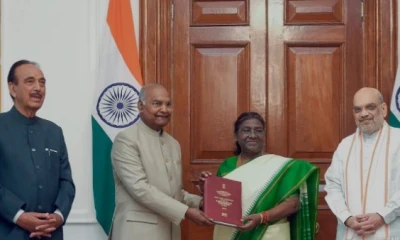The High-Level Committee on ‘One Nation One Election’, chaired by former President Ram Nath Kovind, has proposed significant measures regarding the synchronisation of elections in Bharat. In its report submitted to President Droupadi Murmu at Rashtrapati Bhavan, the committee recommended several key changes aimed at streamlining the electoral process.
One of the notable recommendations is the provision for fresh elections in case of a hung Assembly or Parliament, or if a no-confidence motion leads to the formation of a new House. In such scenarios, elections may be conducted for the remainder of the five-year term, ensuring a stable government and continuity in governance.
Furthermore, the committee proposed synchronising elections to Municipalities and Panchayats with the House of the People (Lok Sabha). It suggested a two-step process where simultaneous polls to Lok Sabha and assemblies would be held first, followed by local body elections within 100 days. This proposal would require ratification by at least half of the States.
The committee emphasised that its recommendations aim to enhance transparency, inclusivity, ease, and confidence among voters. It asserted that overwhelming support for simultaneous elections would accelerate the development process, foster social cohesion, and strengthen Bharat’s democratic framework.
The extensive report, spanning over 18,626 pages, is the culmination of rigorous consultations with stakeholders, experts, and research spanning 191 days since its inception on September 2, 2023.
Noteworthy members of the committee include Union Minister Amit Shah, former Opposition Leader in Rajya Sabha Ghulam Nabi Azad, former Chairman of the 15th Finance Commission NK Singh, and others. The committee engaged with political parties, experts in law, business organisations, economists, and various stakeholders to gather insights and perspectives on the matter.
The proposed reforms aim to address concerns regarding the economic impact of asynchronous elections, with experts warning about its adverse effects on inflation, economic growth, public expenditure, and social harmony.
The Central Government’s initiative to form this high-level committee underscores its commitment to exploring and implementing reforms that enhance the efficiency and integrity of the electoral process in Bharat.

















